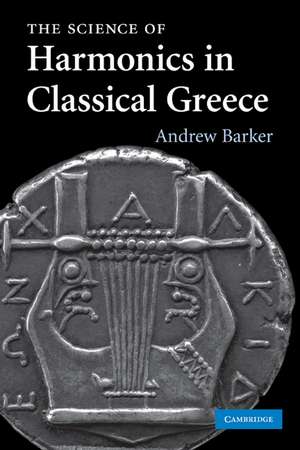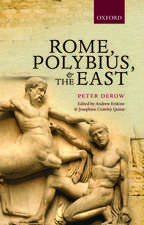The Science of Harmonics in Classical Greece
Autor Andrew Barkeren Limba Engleză Paperback – 15 iun 2011
| Toate formatele și edițiile | Preț | Express |
|---|---|---|
| Paperback (1) | 449.55 lei 6-8 săpt. | |
| Cambridge University Press – 15 iun 2011 | 449.55 lei 6-8 săpt. | |
| Hardback (1) | 873.67 lei 6-8 săpt. | |
| Cambridge University Press – 12 sep 2007 | 873.67 lei 6-8 săpt. |
Preț: 449.55 lei
Nou
Puncte Express: 674
Preț estimativ în valută:
86.02€ • 91.99$ • 71.72£
86.02€ • 91.99$ • 71.72£
Carte tipărită la comandă
Livrare economică 18 aprilie-02 mai
Preluare comenzi: 021 569.72.76
Specificații
ISBN-13: 9780521289955
ISBN-10: 0521289955
Pagini: 494
Dimensiuni: 152 x 229 x 28 mm
Greutate: 0.72 kg
Editura: Cambridge University Press
Colecția Cambridge University Press
Locul publicării:Cambridge, United Kingdom
ISBN-10: 0521289955
Pagini: 494
Dimensiuni: 152 x 229 x 28 mm
Greutate: 0.72 kg
Editura: Cambridge University Press
Colecția Cambridge University Press
Locul publicării:Cambridge, United Kingdom
Cuprins
Part I. Preliminaries: Introduction; 1. Beginnings, and the problem of measurement; Part II. Empirical Harmonics: 2. Empirical harmonics before Aristoxenus; 3. The early empiricists in their cultural and intellectual contexts; 4. Interlude on Aristotle's account of a science and its methods; 5. Aristoxenus: the composition of the Elementa harmonica; 6. Aristoxenus: concepts and methods in Elementa harmonica Book 1; 7. Elementa harmonica Books 2-3: the science reconsidered; 8. Elementa harmonica Book 3 and its missing sequel; 9. Contexts and purposes of Aristoxenus' harmonics; Part III. Mathematical Harmonics: 10. Pythagorean harmonics in the fifth century: Philolaus; 11. Developments in Pythagorean harmonics: Archytas; 12. Plato; 13. Aristotle on the harmonic sciences; 14. Systematising mathematical harmonics: the Sectio canonis; 15. Quantification under attack: Theophrastus' critique; Postscript: The later centuries.
Recenzii
Review of the hardback: 'This is a fine, important book from one of the pillars of Greek musical scholarship, and should be carefully digested to the last footnote by every serious student of the subject.' Mnemosyne
Review of the hardback: 'The significance of Harmonics in Classical Greece - which displays all the features needed to become a classic for both studies in Classics and in musicology - does not only regard ancient philosophical and scientific studies. Indeed it sheds light on important aspects for medieval musicologists and for 16th and 17th -century debates, marked by a return to the ancient, even thanks to the Latin translation of Plutarch's De musica published by Carlo Valgulio in 1507.' Nuncius: Journal of the History of Science
Review of the hardback: 'Barker has written an important book for anyone interested in ancient Greek music theory and its relationship with other intellectual activities of the time, such as philosophy and the empirical or mathematical sciences.' Bryn Mawr Classical Review
Review of the hardback: 'The significance of Harmonics in Classical Greece - which displays all the features needed to become a classic for both studies in Classics and in musicology - does not only regard ancient philosophical and scientific studies. Indeed it sheds light on important aspects for medieval musicologists and for 16th and 17th -century debates, marked by a return to the ancient, even thanks to the Latin translation of Plutarch's De musica published by Carlo Valgulio in 1507.' Nuncius: Journal of the History of Science
Review of the hardback: 'Barker has written an important book for anyone interested in ancient Greek music theory and its relationship with other intellectual activities of the time, such as philosophy and the empirical or mathematical sciences.' Bryn Mawr Classical Review
Descriere
This 2007 book examines the ancient science of harmonics, the most important branch of Greek musical theory.



















